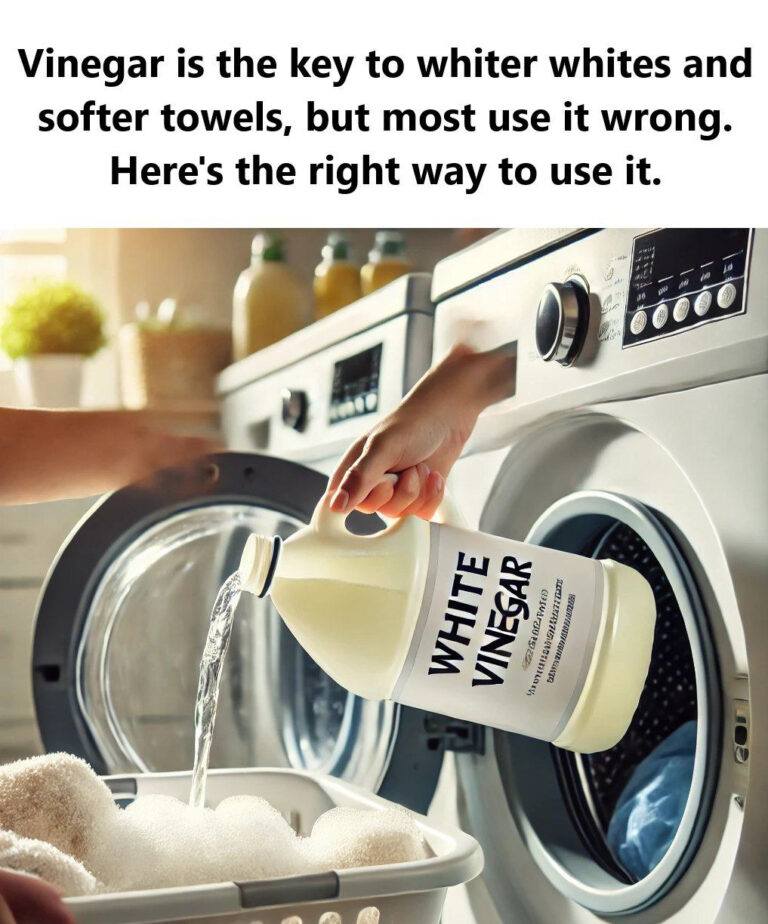ADVERTISEMENT
2. Add Vinegar to the Rinse Cycle
The most effective way to use vinegar is during the rinse cycle. This is when vinegar has the most impact, as it can remove detergent residues, soften fabrics, and brighten clothes.
- For top-load washers, add the vinegar directly to the rinse cycle when the machine starts to fill with water. You can do this by pouring it into the fabric softener dispenser.
- For front-load washers, you can add vinegar to the fabric softener compartment before starting the cycle. The washer will release it at the right time during the rinse cycle.
3. Don’t Mix Vinegar with Bleach
Although vinegar is a great natural cleaner, never mix vinegar with bleach, as the combination can produce harmful fumes. If you want to use both vinegar and bleach in your laundry routine, make sure they are used in separate cycles.
4. For Stubborn Odors
If you’re dealing with particularly stubborn odors, such as smoke or pet smells, you can add 1 cup of vinegar to the wash cycle. It will help neutralize strong odors and leave your clothes smelling fresh.
5. Use Vinegar for a Monthly Washing Machine Cleaning
To keep your washing machine clean and free of residue build-up, run a monthly cleaning cycle with just vinegar. Add 2 cups of vinegar to the drum of your empty washing machine, then run a hot water cycle. This will help eliminate detergent build-up, soap scum, and mineral deposits that could affect the cleanliness and efficiency of your machine.
The Benefits of Using Vinegar Over Commercial Cleaners
Switching to vinegar for laundry offers many advantages over traditional commercial detergents and fabric softeners:
- Natural and Chemical-Free: Vinegar is a natural product that doesn’t contain harsh chemicals, artificial fragrances, or dyes, making it safer for both your clothes and the environment.
- Eco-Friendly: Unlike many commercial laundry products, vinegar is biodegradable, non-toxic, and comes in recyclable packaging.
- Cost-Effective: Vinegar is inexpensive compared to fabric softeners and detergents, making it a budget-friendly option for those looking to save on laundry products.
- Gentle on Clothes: Vinegar helps prevent detergent build-up and protects fabrics from the damage that can be caused by synthetic chemicals in commercial cleaners.
When Not to Use Vinegar
While vinegar is a great laundry helper, it’s not always suitable for every fabric or situation. Be cautious in the following cases:
- Delicate fabrics: Avoid using vinegar on delicate fabrics like silk or wool, as the acidity may cause damage to the fibers.
- Colored fabrics: Though vinegar is generally safe for colored fabrics, always test it on a small, inconspicuous area before using it extensively, as it may cause some fabrics to fade.
- Bright-colored towels: Use caution when using vinegar on brightly colored towels, as there’s a small risk of color fading.
Conclusion: Unlock the Full Potential of Vinegar in Your Laundry Routine
Vinegar is one of the most underrated yet effective natural cleaners that can transform your laundry routine. From softening towels and brightening clothes to eliminating odors and acting as a natural fabric softener, vinegar is a true laundry powerhouse.
To get the best results, always use white vinegar, add it to the rinse cycle, and avoid overusing it. When used correctly, vinegar will leave your laundry fresher, softer, and free from chemical residues, all while being eco-friendly and budget-friendly.
Next time you’re doing laundry, give vinegar a try and see the difference it can make in your clothes and towels. It’s time to unlock the full potential of this simple, natural solution!
ADVERTISEMENT
ADVERTISEMENT
